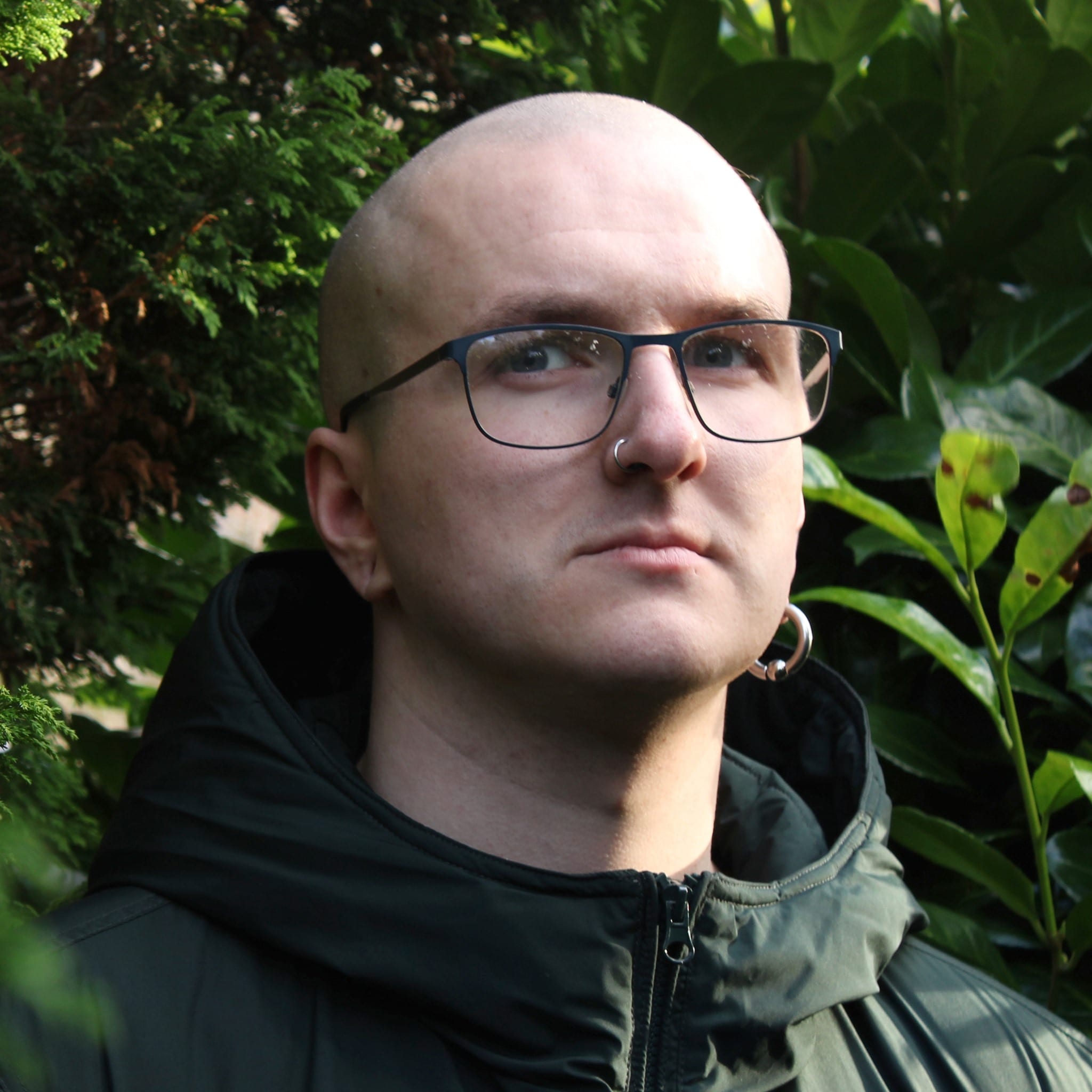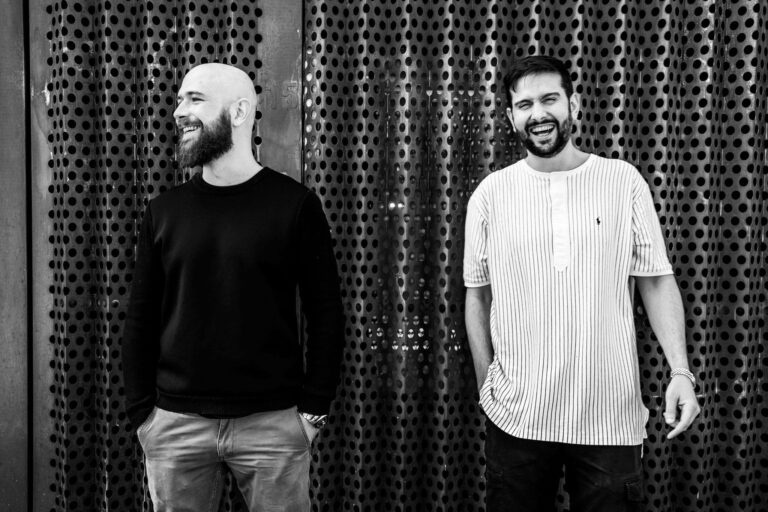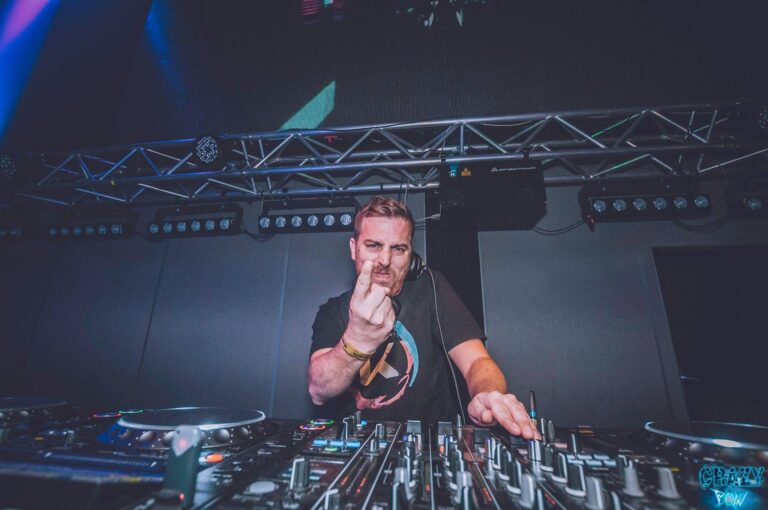The fusion of exotic instruments with electronic music, the old with the new, is something that has proven to have worked countless times. Within the realms of dubstep, the fusion has been rife since the genre’s earliest incarnations. Caspa & Rusko’s seminal Fabriclive 37 is just one example as tracks like Cockney Violin and Girl from Codeine City effortlessly transported listeners to somewhere far away from where bass-heavy music is often set.
This use of sounds from lands far away is something that Mungk has become known for utilising in his music. Despite being based in the hardly tropical UK, the use of asian and middle eastern instruments in his music has become central to his sound as a producer.
He’s taken this a step further for his first artist LP, Temple of Mungk. Out now on DUPLOC, the album tells the story of a monk from China who embarks on a spiritual journey to understand how others live as he begins to question his faith. The LP and the order of the tracklisting follows the monk as he starts his journey in China and travels through India, into the Middle-East before making his way across Africa and finally back to China, with each track set in the countries that he passes through on his journey.
You can listen to the whole album journey in mixed form right here. Read on to find out more about Mungk, his process for the album and where the intriguing concept came from.
How has lockdown been for you creatively?
It’s definitely gotten better, I had a lot of gigs lined up last year which all fell through. It was quite brutal as I’d just started to see my bookings take-off after working on my music for a good few years and then the first lockdown happened. As a producer, you think the silver lining is that more time indoors would be a good opportunity to work on new music. But the pressure of knowing that was the only thing that I could do with my time led to a pretty intense period of creative block. I do feel like I’ve come out of it now, but the initial impact of it crushed me.
How did you overcome the block?
Having this album to work on definitely helped. Just having a big project to focus on gave me a reason to make music again, rather than doing it for the sake of it.
Would you say the album was a direct product of lockdown then?
Sort of. There were a couple of tracks that I’d finished beforehand, but they weren’t intended for an album at that point. It was actually Pieter from DUPLOC who emailed me because he wanted to start a series of full-length albums. I’d never considered doing an album before then. I think he thought that because my style is maybe a bit more musical and melody-focused than your average dubstep, that it would suit the context of an album and compliment the idea of telling a story with music. Once I had the idea there though, it all came together pretty quick so I’d say 90% of it was made in lockdown.
So a pandemic and a bit of motivation from someone else led to you making a 17-track album, which goes beyond the typical length of an LP.
Yeah, they just kept on coming! Once I had the concept I kept on making tunes and I didn’t want to take any of them out so it just ended up being a long one. I wanted that epic journey vibe anyway so I’m happy with the result.
So they all made the final cut?
Yeah, I was quite happy with that. I was really focusing on building something that could be listened to as one cohesive piece of work, rather than a bunch of separate tracks. I was fortunate that DUPLOC saw it like that too. He said that there were certain tracks that maybe he wouldn’t have usually signed, but he was happy to leave them in because they worked within the context of the album and telling its story. The final product is the story exactly as I wanted to tell it with no edits or compromises.
It must be motivating to have that sort of reception to it.
Definitely, I’m very glad that it makes sense to other people too [laughs]!
What’s the idea behind the album then?
The concept is based around themes of spirituality and fuses philosophical and mythological beliefs from around the world. The story follows the narrative of a monk’s quest to achieve enlightenment through experiencing different cultures as he travels through Asia and down the length of Africa. It’s an adventure story at its heart. I’ve always been infusing world instrumentation into my music and that was what I continued rolling with for the album. The story flows in a way that would make sense geographically so I have made use of traditional instrumentation and field recordings from the specific countries that the protagonist passes through. The tracks are then ordered in a way that would make sense as if you were travelling this path, from country to country. I wanted this album to be a celebration of diversity, touching on the concept that two truths can exist simultaneously and how peace can be found through the balancing of these truths.
Where did the idea come from?
So the instruments and sounds of world music have been a prominent part of my sound since the beginning.I find that certain sounds have such strong connotations with their places of their origin that they’re very effective in conjuring imagery for the listener. I also love the fusion of organic, human elements within the context of electronic music. I knew I wanted my album to really focus on these themes and I guess the story then formed over time as I had to find a way to link all the tunes together. I think I had the idea of putting it in geographical order about halfway through the process. Being such a big project, I also wanted to make it personal and to represent myself and my interests as a person. Spirituality, philosophy and travel are all great passions that I have and I love the idea of finding ways to infuse my non-musical interests into my work as well.
Have you been to any of the countries where the album is set?
Yes, I was fortunate to visit South Africa back in 2019 and was also supposed to be visiting China this year. Then of course, COVID happened. When the virus allows, there are a lot of places that I’d like to go to. It would be amazing if I managed to do the entire route of the album one day.
That must be quite a long journey [laughs]!
It would be ridiculous, I don’t think I’d be able to do it in one go. If I manage to visit all of the places the album is set in, that’d be very cool.
As you’ve mentioned, you used quite a wide range of instruments in the album. Did you record them yourself or was it mainly sample-based?
It’s a combination. A lot of them are samples because some of these instruments are hard to get hold of and are of course, quite expensive too. But I do also have quite a good collection of smaller instruments, things like kalimbas and more handheld stuff, which I recorded in. I also played all the guitar parts myself, which are kind of scattered across the album. I wanted to make sure I got the guitar in there as a nod to my musical history before making beats, being from a live music background where guitar was my instrument of choice. The dubby track ‘Shasha’ actually features all live instrumentation played by myself including guitar, bass and melodica. Sample-wise though, I did a lot of research into which instruments would be used where before then tracking down good quality samples of those particular sounds, which was a process in itself.
Were there any areas or countries that you struggled with?
I’d say it was fairly easy to find Indian and Chinese instruments, as I was familiar with a lot of them. But when I got to the Middle East section, travelling between India and Africa, that was a bit more of a grey area to me because I didn’t know which instruments exactly to look for. The research was a really interesting process.
You said that you have a few instruments in your studio, what’s your favourite?
So when I went to South Africa, I ran into this guy who had a workshop where he makes and sells his own instruments. I don’t even know what it’s called, but it’s basically a type of flute made from seaweed. He’d just finished making it when I met him and kindly sold it to me. I brought that back with me and used it in the album a few times. That’s probably the most interesting instrument that I have.
Wow!
Yeah, it’s only got one hole so you have to cover it different amounts with your thumb as you blow through it to get different sounds. It’s really difficult to play as it’s essentially a tube made out of seaweed. I’ve had it for a couple of years now and still only managed to get a single note out of it.
It’s cool that you were able to use an instrument from your own journey as part of the journey in the album. All of the tracks are 140, was that intentional or did it happen naturally?
Originally, I wanted to do something that was multi-genre. I didn’t intend on going too far away from dubstep, but I did want to work with different tempos. I made a certain amount of tunes and got to a point where I had so many dubstep tracks that I thought it’d be weird to put some non-dubstep tunes in there. When I spoke to DUPLOC about it, he pointed out that a lot of producers seem to use an album as an opportunity to experiment with stuff outside of their usual tempo. So the fact that all of my album is at 140 makes it unique in a way. I then took this as a challenge to see how many different styles and influences I could fit into that tempo. Setting restrictions can actually be really good for the creative process sometimes, it forces you to approach things differently.
It’s definitely not just a dubstep album. You’ve experimented with pace and energy levels across it.
I think there are definitely varying energy levels throughout. I was also looking at drum patterns a lot to create the variety. There are the choppy grime patterns, which contrast to the more dubby tracks, and there are also some 4×4 tracks which are more techno influenced. Then of course, the ambient section with no drums at all!
Now you’ve finished the album, what have you been up to?
I have been experimenting with different tempos a bit more, I’ve actually been making more dub influenced stuff as well as a lot more ambient. I’m definitely not taking a break from the studio as I find that too difficult. I’ve just finished the second year of my degree so I’m supposedly on summer break right now but I have to fill it with projects or I will get very bored. I think I function a lot better when I have direction, though this does always mean my head is in the future and I struggle to be present. I’m actually practicing Buddhism right now to try and get better at this. It’s really a balancing act being very career-driven while trying to still enjoy the moment at hand. I’m also trying to figure out how I can actually follow-up on such a big project. When you reach such a massive milestone, what do you do next?
I can imagine it being a bit daunting. Especially when it’s such a big project that takes you on such a detailed journey.
For sure. I do have some releases lined up that were signed a while ago, but I have this worry that it’s not going to be as satisfying now. I feel like I’ll have an urge to do more big projects in the future. Hopefully this won’t be the only album that I do. Maybe I’ll release less projects but just make them more extensive when I do.
I guess there’s no reason not to! DJ support can be quite an important and powerful part of releasing electronic music. Since there are some tracks on the album that would go down well in a club, did you have any concerns about releasing an album during lockdown?
As I tried to make the album one cohesive listening experience, it’s definitely more of a home listener. A few of the tracks can be utilised by a DJ, but that’s not what I was thinking about when I was making it. I also finished the album a lot quicker than DUPLOC expected so we didn’t intend on releasing it so soon, but once it was finished and ready to go we wanted to roll with it. I never considered the impact of COVID too much, but I didn’t make it for the dancefloor so it wasn’t too much of a concern. If anything, people might have more time to sit down and listen to it all the way through while gigs aren’t happening.
That’s a good point, it deserves to be listened to in full. Do you have any plans for your label, SND SYSTM CLTR?
Just carrying on as we are. We try to do one release a month and then every five releases or so, we do a compilation. We use them as an opportunity to get less established artists on board with all of the money going to charity. There’s no pressure to make money from it then and it allows us to raise funds for a good cause. It makes it easy to get new artists involved and gives them the opportunity to potentially have their own releases further down the line.
That’s amazing, is there a particular charity that you donate to?
We’ve been raising money for Black Lives Matter. We did the first compilation around the time that George Floyd was murdered and raising money from the music allowed us to help out in a small way. I also feel it’s relevant to the label, as sound system culture is a direct product of black culture. It makes sense and feels right to find some way of giving back to those who paved the way for us.
That’s a great idea, it must be nice to donate to such a relevant cause. Last question, imagine if you came home one day and realised there was a fire in your studio and all of your equipment had gone up in flames. If you could only save one thing, what would it be?
I have a Japanese Fender Telecaster guitar which was passed down from my grandad so it would probably have to be that. But if that had gone, then it’d probably have to be the records that I released. They’re my biggest accomplishments. Music is what I live for so there isn’t a lot that is more important to me, especially in terms of belongings.
Is there a particular release that you’d save?
If I had the album, then it’d be that. But I don’t have it yet so currently it’d be my EP that came out on DUPLOC before. I’ve had a handful of white label releases, but that was my first release to feature full artwork and have my name printed on it. A pretty big moment for me!
Is there anyone you want to shout out?
First and foremost, I can’t thank Pieter at DUPLOC enough. I never saw myself having the opportunity to do something this big and well thought out. Him putting all of this time, energy and money behind me to do it properly and have me so involved in the process has been immense. I’m very, very grateful. Of course, my family and friends too who support what I do. Also, just anyone that has listened to or supported my music in any way over the years. It really is a grind to get people to pay attention to your art so I am just so so happy that anyone cares in the first place to be honest [laughs]!
Mungk – Temple Of Mungk is out now on DUPLOC
Follow Mungk: Facebook / Soundcloud / Instagram



